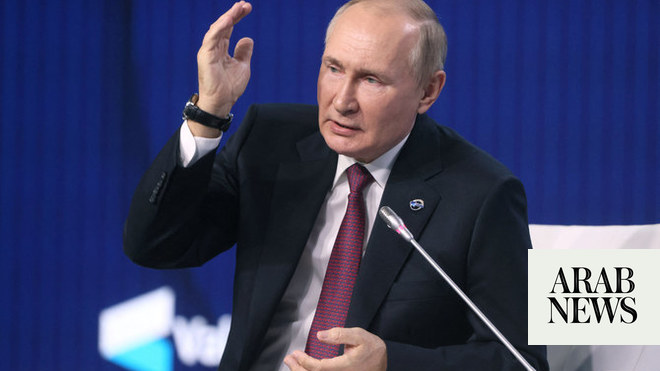
Last week’s agreement establishing the maritime border between Lebanon and Israel was the fruit of 11 years of tortuous diplomacy, but never has a deal been greeted with such bashfulness by both sides. A signing ceremony on the White House lawn? Far from it — these two signatories, sworn enemies who are technically at war with each other, could not even bear to be in the same country.
US Secretary of State Antony Blinken said the agreement would generate “critically needed foreign investment for the Lebanese people as they face a devastating economic crisis.” However, not a drop of gas has so far been discovered in the exclusively Lebanese Qana offshore field. Even if hydrocarbons are found in meaningful quantities, extraction will take years — and we only have to look at Iraq, Venezuela and Libya to realize that such wealth can be as much a curse as a blessing. There are also concerns that oil and gas legislation may have been designed to enable corrupt politicians to make vast fortunes, while preventing the revenues from reaching Lebanese citizens.
Welcoming the border agreement, Tehran’s propagandist-in-chief Hassan Nasrallah rambled on about the “strength of the resistance,” and fantasized about how Hezbollah and its rag-tag alliance of Iran-financed militias had somehow terrorized Israel into making compromises.
Even if there were a shred of truth in this nonsense, is this how Nasrallah advocates that diplomacy should be conducted in future? Perhaps threatening to bomb the World Bank might produce the loan offers that have so inconveniently eluded Lebanon thus far; or attacking European shipping could muster greater international assistance for the country in its hour of need.
Nasrallah understands only the language of force. It’s easy to threaten drone attacks on a neighbor’s oil infrastructure as a means to achieve short-term demands, but even the average five-year-old knows that such tactics are the fastest route to pariah statehood.
We have been treated to a masterclass in schizophrenic doublespeak from Hezbollah: Nasrallah invited his supporters to view the deal with “a patriotic spirit,” but hard-liners have reacted with anger and confusion to this “betrayal”: Aren’t we at war with Israel and committed to Israel’s destruction? Shouldn’t we be arguing that the entire Palestinian coast is Arab territory? What happened to “next year we’ll be in Jerusalem?”
In fact, as a senior Israeli official pointed out: “The deal weakens Hezbollah and weakens Iran’s grip on Lebanon. Hezbollah would rather the deal didn’t exist, but once it was on the table and the Lebanese public realized a deal was within reach, it became impossible for Hezbollah to justify preventing it.”
With the maritime border deal, Hezbollah and its “resistance” are rapidly running out of reasons to exist.
Baria Alamuddin
Some analysts have argued that with the prospects of a revived Iran nuclear deal disappearing over the horizon, Israel saw the maritime border agreement as a means of reducing the likelihood of a conflagration on its northern borders. But Hezbollah remains the plaything of Iran, and if Tehran choses the path of confrontation, or if Israel launches preemptive strikes on Iranian nuclear sites, nothing will keep Lebanon out of the resultant bloodletting. Nasrallah ignores the reality that in any such conflict the US and its allies would not idly sit by. One former UK minister told me that “of course” Britain and other states would intervene in support of Israel.
This maritime border agreement coincided with Michel Aoun’s departure from Lebanon’s presidential palace. Many of his allies hailed the deal as the “crowning achievement” of his six years in office. In reality, his presidency has been an unrelenting disaster, with the pinnacle of his achievements being Lebanon’s total economic and political collapse. The smattering of supporters bused in to camp outside his palace and bid the departing president farewell was a cheap gimmick that served only as a reminder of how little support Aoun enjoys.
His son-in-law Gebran Bassil still fantasizes that he can be president, but even Hezbollah no longer enthusiastically backs his candidacy. The best he can look forward to is his forthcoming electoral wipe-out, having sold his own soul and that of his Christian faction to “Hizb Al-Shaitan.” If ever an inventor discovered a way to convert hatred into electricity, the Lebanese people’s overwhelming loathing of Bassil could end the country"s power shortages at a stroke.
In fact, with the maritime border deal, Hezbollah and its “resistance” are rapidly running out of reasons to exist. Now that Nasrallah has conquered the seas, the single remaining fig-leaf justifying Hezbollah’s retention of its weapons is the cause celebre of the Shebaa Farms border area, which is universally acknowledged to be Syrian territory — as if there existed a legitimate, sovereign Syrian government that could claim it.
Meanwhile Lebanon still needs a long-term path to prosperity. The prospect of exploiting hydrocarbon reserves in the Mediterranean is one step on that path, but more will be required. A second gamechanger would be fulfilment of UN mandates for the complete removal of armed entities from Lebanon’s political arena, in a manner that would allow international donors to turn the financial taps back on so that billions of dollars of funding and investment can be restored. A third priority must be radical action to address rampant corruption, before Lebanon’s elite of robber barons and warlords can drain the coffers dry of incoming gas wealth.
Lebanon has two possible futures: One is conflict and disintegration, the other is prosperity and rebirth. Nasrallah calls for “patriotic spirit”— if only Hezbollah possessed sufficient patriotism to allow Lebanese citizens to grasp their own future for themselves.
• Baria Alamuddin is an award-winning journalist and broadcaster in the Middle East and the UK. She is editor of the Media Services Syndicate and has interviewed numerous heads of state.












